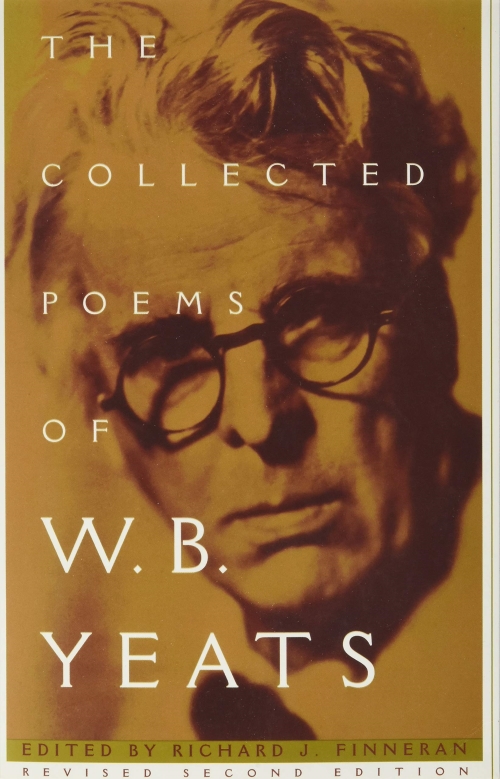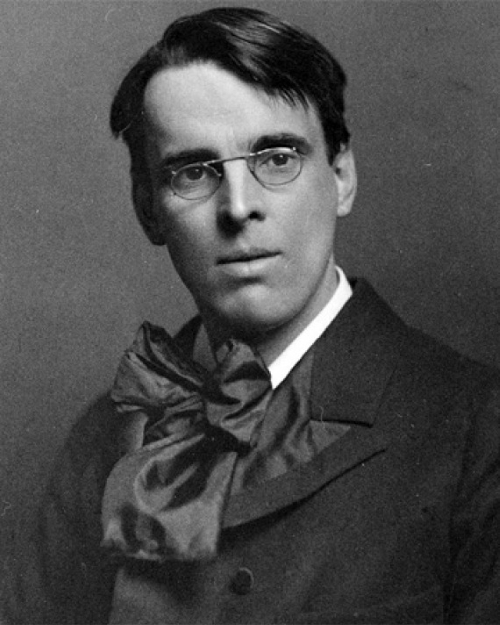IMany ingenious lovely things are goneThat seemed sheer miracle to the multitude,protected from the circle of the moonThat pitches common things about. There stoodAmid the ornamental bronze and stoneAn ancient image made of olive wood—And gone are Phidias’ famous ivoriesAnd all the golden grasshoppers and bees.We too had many pretty toys when young:A law indifferent to blame or praise,To bribe or threat; habits that made old wrongMelt down, as it were wax in the sun’s rays;Public opinion ripening for so longWe thought it would outlive all future days.O what fine thought we had because we thoughtThat the worst rogues and rascals had died out.All teeth were drawn, all ancient tricks unlearned,And a great army but a showy thing;What matter that no cannon had been turnedInto a ploughshare? Parliament and kingThought that unless a little powder burnedThe trumpeters might burst with trumpetingAnd yet it lack all glory; and perchanceThe guardsmen’s drowsy chargers would not prance.Now days are dragon-ridden, the nightmareRides upon sleep: a drunken soldieryCan leave the mother, murdered at her door,To crawl in her own blood, and go scot-free;The night can sweat with terror as beforeWe pieced our thoughts into philosophy,And planned to bring the world under a rule,Who are but weasels fighting in a hole.He who can read the signs nor sink unmannedInto the half-deceit of some intoxicantFrom shallow wits; who knows no work can stand,Whether health, wealth or peace of mind were spentOn master-work of intellect or hand,No honour leave its mighty monument,Has but one comfort left: all triumph wouldBut break upon his ghostly solitude.But is there any comfort to be found?Man is in love and loves what vanishes,What more is there to say? That country roundNone dared admit, if such a thought were his,Incendiary or bigot could be foundTo burn that stump on the Acropolis,Or break in bits the famous ivoriesOr traffic in the grasshoppers or bees. IIWhen Loie Fuller’s Chinese dancers enwoundA shining web, a floating ribbon of cloth,It seemed that a dragon of airHad fallen among dancers, had whirled them roundOr hurried them off on its own furious path;So the Platonic YearWhirls out new right and wrong,Whirls in the old instead;All men are dancers and their treadGoes to the barbarous clangour of a gong. IIISome moralist or mythological poetCompares the solitary soul to a swan;I am satisfied with that,Satisfied if a troubled mirror show it,Before that brief gleam of its life be gone,An image of its state;The wings half spread for flight,The breast thrust out in prideWhether to play, or to rideThose winds that clamour of approaching night.A man in his own secret meditationIs lost amid the labyrinth that he has madeIn art or politics;Some Platonist affirms that in the stationWhere we should cast off body and tradeThe ancient habit sticks,And that if our works couldBut vanish with our breathThat were a lucky death,For triumph can but mar our solitude.The swan has leaped into the desolate heaven:That image can bring wildness, bring a rageTo end all things, to endWhat my laborious life imagined, evenThe half-imagined, the half-written page;O but we dreamed to mendWhatever mischief seemedTo afflict mankind, but nowThat winds of winter blowLearn that we were crack-pated when we dreamed. IVWe, who seven years agoTalked of honour and of truth,Shriek with pleasure if we showThe weasel’s twist, the weasel’s tooth. VCome let us mock at the greatThat had such burdens on the mindAnd toiled so hard and lateTo leave some monument behind,Nor thought of the levelling wind.Come let us mock at the wise;With all those calendars whereonThey fixed old aching eyes,They never saw how seasons run,And now but gape at the sun.Come let us mock at the goodThat fancied goodness might be gay,And sick of solitudeMight proclaim a holiday:Wind shrieked—and where are they?Mock mockers after thatThat would not lift a hand maybeTo help good, wise or greatTo bar that foul storm out, for weTraffic in mockery. VIViolence upon the roads: violence of horses;Some few have handsome riders, are garlandedOn delicate sensitive ear or tossing mane,But wearied running round and round in their coursesAll break and vanish, and evil gathers head:Herodias’ daughters have returned again,A sudden blast of dusty wind and afterThunder of feet, tumult of images,Their purpose in the labyrinth of the wind;And should some crazy hand dare touch a daughterAll turn with amorous cries, or angry cries,According to the wind, for all are blind.But now wind drops, dust settles; thereuponThere lurches past, his great eyes without thoughtUnder the shadow of stupid straw-pale locks,That insolent fiend Robert ArtissonTo whom the love-lorn Lady Kyteler broughtBronzed peacock feathers, red combs of her cocks.
Nineteen Hundred and Nineteen
Feature Date
- February 14, 2022
Series
- What Sparks Poetry
Selected By
Share This Poem
Print This Poem
“Nineteen Hundred and Nineteen” from THE COLLECTED POEMS OF W.B. YEATS: by W.B. Yeats.
Published by Scribner Book Company September 9th, 1996.

New York, New York
Simon & Schuster
The Collected Poems of W. B. Yeats includes all of the poems authorized by Yeats for inclusion in his standard canon. Breathtaking in range, it encompasses the entire arc of his career, from luminous re-workings of ancient Irish myths and legends to passionate meditations on the demands and rewards of youth and old age, from exquisite, occasionally whimsical songs of love, nature, and art to somber and angry poems of life in a nation torn by war and uprising. In observing the development of rich and recurring images and themes over the course of his body of work, we can trace the quest of this century's greatest poet to unite intellect and artistry in a single magnificent vision.
Poetry Daily Depends on You
With your support, we make reading the best contemporary poetry a treasured daily experience. Consider a contribution today.




